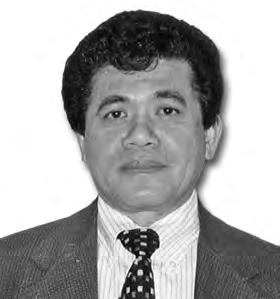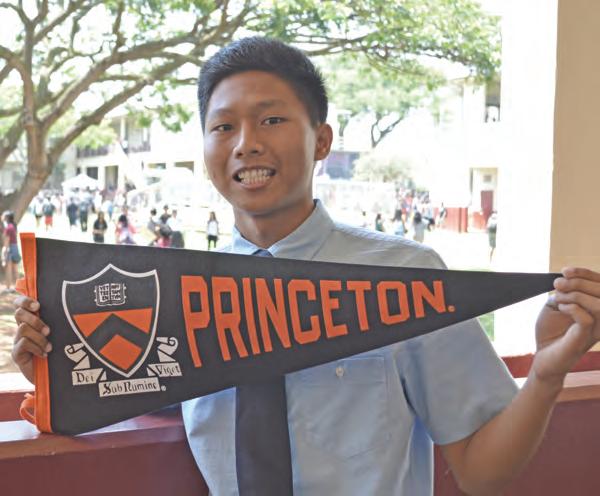2 News Edition
may 24, 2014
editorial
EDCA Is Mutually Beneficial For Both The U.S. and The Philippines
T
he Enhanced Defense Cooperation Agreement (EDCA) signed by the U.S. and Philippines is a deal that appears to be mutually beneficial at this preliminary stage, but ought to be pursued cautiously as the details are worked out. The Philippines must abide by its Constitution in ensuring that no foreign bases are allowed to be established in its country, and avoid "a (U.S.) base within a (R.P) base situation as some critics of EDCA say could occur. Militarily and politically, the Philippines has come so far in establishing its sovereignty from all colonial powers that it would be damaging to allow any foreign interference, in practice or appearance, to influence its affairs as an independent nation. That would be, as leftists claim, setting the clock backwards.
What iS EDCa? EDCA is a new 10-year agreement that gives the U.S. military greater access to Philippine bases. It will give American forces access to selected R.P military camps to allow the U.S. to preposition fighter jets and ships, and to use Philippine airstrips and ports. A Filipino base commander will have access to areas to be shared with American forces. The U.S. will not pay rent for local camp areas, but the Philippines will own whatever building or infrastructure to be built by Americans on Philippine bases. President Barack Obama emphasized: "I want to be absolutely clear -- the new defense cooperation agreement is not about trying to reclaim old bases or build new bases. Rather, any new agreement would give American service members greater access to Filipino facilities, airfields and ports, which would remain under the control of the Philippines." The U.S. withdrew its military forces in 1992, after the Philippines decided to close American bases Clark and Subic. Even though the bases have been closed, the Philippines remains a close ally of the U.S. and has an active Defense Treaty signed in 1951 with the U.S. That Defense Treaty is similar to others signed by other allies in the region -Japan, South Korea, Thailand, New Zealand, and Australia -- that states that the U.S. would come to the aid of the Philippines if it were to be attacked militarily.
Win-Win Situation Where EDCA becomes more meaningful to the Philippines outside of the Defense Treaty of 1951, is that EDCA allows for a stronger blanket of security for the Philippines with possibly immediate response time from the U.S. in the event of a military incursion. Tensions between the Philippines and China in the South China Sea have been escalating. Recently China blocked two Philippine ships bringing supplies to Filipino soldiers stationed in a naval vessel at the Ayungin Shoal, which serves as a permanent Philippine government installation. The Philippines set that installation in 1999 in response to China's illegal occupation of the Mischief Reef in 1995, also claimed by the Philippines. The U.S. called the recent attempted blockade by China "a provocative move that raises tensions. The U.S. is also careful not to be provocative as well. "Our goal is not to counter China. Our goal is not to contain China. Our goal is to make sure international rules and norms are respected and that includes in the area of international disputes," Obama said about EDCA. Doublespeak or not, through EDCA, the U.S. guarantees a stronger presence in the Asia-Pacific rim region that ultimately offsets any adventurism that China might have. With globalization, where the economic and commercial stakes are even higher in Asia, it bodes well for the U.S. to maintain strong military ties with the Philippines, which could be a springboard to any military encounter with China. The Philippines' anemic military has proven not to be a deterrent to China so the Philippines will benefit from increased U.S. presence. In 2012, Chinese coast guard ships surrounded another contested offshore South China Sea Territory, the disputed Scarborough Shoal. The disputed territories are near strategic sea-lanes with petroleum both originating in and passing through sea routes. That is why the contested territories in that entire region has become such a hot issue among claimant countries. China has been engaged in disputes in the region with the Philippines and recently Japan. Another upshot of EDCA for the Philippines is having U.S. forces in the country to assist in natural disasters. In light of Super Typhoon Haiyan, (continued on page 3)
NEWS EDITION Charlie Y. SONIDO, M.D. Publisher and Executive Editor
Chona A. MONTESINES-SONIDO Publisher and Managing Editor
Dennis GALOLO Edwin QUINABO Associate Editors
Belinda A. AQUINO, Ph.D. Contributing Editor
Columnists Carlota Hufana Ader Emil Guillermo Grace F. Fong, Ed.D. Ruth Elynia Mabanglo, Ph.D. J. P. Orias Pacita Saludes Reuben S. Seguritan, Esq. Charlie Sonido, M.D. Emmanuel S. Tipon,Esq. Felino S. Tubera Amado Yoro Sylvia Yuen, Ph.D.
www.thefilipinochronicle.com www.efilipinochronicle.com
Contributing Writers Clement Bautista, Teresita Bernales, Ed.D, Serafin Colmenares, Jr., Ph.D., Linda Dela Cruz, Fiedes Doctor, Danny De Gracia, II, MA, Carolyn WeyganHildebrand, Amelia Jacang, M.D., Caroline Julian, Federico Magdalena, Ph.D., Deborah T. Manog, Maita Milallos, Paul Melvin Palalay, M.D., Lilia Q. Santiago, Ph.D., Jay Valdez, Psy.D., Glenn Wakai Creative Designer
Junggoi Peralta Philippine Correspondent
Advertising/Marketing Director
Chona A. Montesines-Sonido Account Executives
Carlota Ader J. P. Orias Big Island Distributor
Grace Larson Ditas Udani Maui Distributor
Greg Garcia
Cecile Piros
Photography
Molokai Distributor
Tim Llena Administrative Assistant
Shalimar Pagulayan
Maria Watanabe MEMbER, SOCIETy OF PROFESSIONAL JOURNALISTS
The Hawaii Filipino Chronicle is published weekly by the Hawaii Filipino Chronicle Inc. It is mailed directly to subscribers and distributed at various outlets around Oahu and the neighbor islands. Editorial and advertising deadlines are three weeks prior to publication date. Subscriptions are available at $75 per year for Oahu and the neighbor islands, continental U.S. $85, foreign country $95. Copyright 2007-2012. The Hawaii Filipino Chronicle Inc. is located at 94-356 Waipahu Depot, Waipahu, HI 96797. Telephone: (808) 678-8930. Facsimile: (808) 678-1829. E-mail: filipinochronicle@gmail.com. Opinions expressed by the columnists and contributors do not necessarily reflect those of the Hawaii Filipino Chronicle management. Reproduction of the contents in whole or in part is prohibited without written permission from the management. All rights reserved. Printed in the USA.



